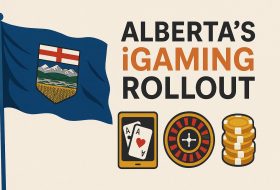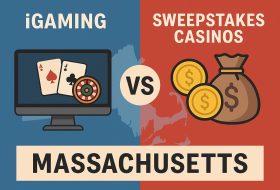
In efforts to combat unauthorised gambling, the Alcohol and Gaming Commission of Ontario (AGCO) has revoked retailer licenses of several businesses in the Greater Toronto Area after finding unlicensed electronic gaming machines operating under the name “Prime Slot”.
Ontario law requires all gaming devices to be registered and approved before they can be sold to the public. The AGCO is responsible for enforcing these standards.
“It makes sure all gaming platforms and products fulfill integrity standards, provide adequate player protection measures, while also ensuring minors and other vulnerable people are safe from harm. Over the recent years, the AGCO has clamped down on illegal gaming machines, especially in high-traffic community areas where kids and other vulnerable groups can find them easily.”
They say those devices circumvent regulation and undermine efforts to keep Ontario gambling safe, controlled, and adult-only.
Since Prime Slot-branded machines were first branded as skill-based games but later determined by the AGCO to be games of chance, the Commission instituted enforcement action against businesses found non-compliant.
AGCO Going After Unlicensed Gaming Machines and Non-Compliant Retailers
Multiple businesses in the Greater Toronto Area (GTA) have faced the wrath of the AGCO for having unlicensed gaming machines. While the commission hasn’t disclosed how many are affected, industry insiders say dozens of lottery retailer licenses have been revoked in the past few weeks.
According to AGCO reports, the businesses broke provincial gaming laws by installing unapproved electronic machines, marketing them as legal skill-based games, and never getting the required regulatory approval. Unlicensed machines, which are not regulated by the province, don’t provide fair play or safeguards against problem gambling.
AGCO CEO Dr. Karin Schnarr says unlicensed gambling equipment have no business being in public retail spaces, especially in locations where minors are present. She notes shielding young people and at-risk groups from unregulated gambling is one of the commission’s top priorities. More inspections will result in further penalties for non-compliant operators as the crackdown continues across Ontario.
She said:
“Unapproved gambling machines have no business being in convenience stores or other locations, particularly those that are available to children and youth.”
Penalized Businesses Have 15 Days to Contest Lottery Retailer Licence Cancellations
In Ontario, the provincial gambling authority strictly regulates chance-based gambling. In fact, it only allows such activities in approved and licensed venues. The Alcohol and Gaming Commission of Ontario (AGCO) reminds operators and industry stakeholders that every promotional incentive, from free spins to bonus cash offers, must comply with provincial advertising standards. Regulators say these offers must be transparent, accurate and not misleading, so players get fair and honest information before they play.
Retailers whose lottery licences have been cancelled have 15 days to appeal the decision or fix the breaches. Appeals are heard by the independent Licence Appeal Tribunal (LAT) which reviews the AGCO’s evidence against the retailer as well as the retailer’s defence.
The tribunal can take weeks or months to deliberate and decisions can result in the licence being reinstated, penalties being modified, or a permanent ban. AGCO says the appeal process is fair and maintains the integrity of Ontario’s regulated gaming industry.
AGCO’s Broader Efforts Against Illegal Gambling
The AGCO is stepping up its fight against illegal gambling, as the province-wide effort to protect consumers and the integrity of the legal gaming industry continues. Attorney General Doug Downey says illegal gambling must be “eradicated” from Ontario’s communities.
Working with provincial legal teams, municipalities, and law enforcement, the AGCO is enforcing compliance with Ontario’s strict gaming regulations. These partnerships allow for swift action against offenders through licence revocations, fines, and, in serious cases, criminal charges.
A key part of the crackdown is the use of advanced digital detection tools to identify unlicensed gaming machines. AGCO inspectors examine both the hardware and software of suspected devices to see if they meet the legal requirements. In cases where the violations may extend beyond regulatory breaches into Criminal Code offences, the Ontario Provincial Police (OPP) can be called in to investigate further.
Officials say this is part of the ongoing effort to prevent unregulated gambling from undermining the province’s legal gaming sector, which funds public services and enforces responsible gambling safeguards. The AGCO warns more enforcement waves are coming and will focus on public spaces where unlicensed machines may be accessible to minors. This is not just about compliance. It’s about consumer protection, community safety and public trust in Ontario’s regulated gaming system.





